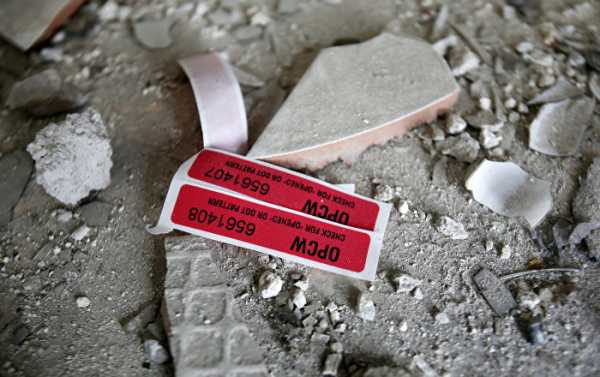
The reported proposal comes amid an alleged chemical attack in Syria’s Douma, as well as a poisoning incident involving former Russian intelligence agent Sergei Skripal.
Western countries are considering a French proposal to establish a new mechanism involving the Organization for the Prohibition of Chemical Weapons (OPCW) that will give the chemical weapons watchdog a mandate for identifying perpetrators behind chemical attacks, Reuters reported.
Currently, the organization only deals with determining whether such an attack has occurred, not with who was responsible for it.
A new mechanism is supposed to fill that gap, but French diplomats argue that the proposal is likely to be met with opposition from Russia and other countries.
“On Syria everything is blocked at the U.N. Security Council and in general we are seeing repeated and systematic flouting of multilateral frameworks, including proliferation of chemical weapons,” a French diplomat said, cited by the news agency.
According to him, the need for such a mechanism is especially evident amid an increasing number of incidents with nerve agents.
“We need a mechanism to apportion blame. Salisbury was a step too far,” he added, commenting on the alleged poisoning attack on former Russian intelligence agent Sergei Skripal, which occurred in the UK two months ago.
On March 4, Sergei Skripal, a former officer from Russia’s Main Intelligence Directorate (GRU), and his daughter, Yulia Skripal, were found unconscious on a bench at a shopping mall in Salisbury.
UK Prime Minister Theresa May rushed to a conclusion, claiming that it was “highly likely that Russia was responsible for the act against Sergei and Yulia Skripal,” adding that Moscow was either behind the poisoning, or allowed the military-grade nerve agent Novichok, “developed by Russia” to get into the hands of those who were. Moscow, in turn, has consistently denied the accusations, calling them “absurd.”
The situation took a sharp turn in early April amid an alleged chemical attack in the Syrian city of Douma, something that was followed by US-led airstrikes despite the fact that Damascus strongly denied the allegations, adding that the use of chemical weapons in the suburb of the capital could have been planned by terrorist groups.
Following the events, the first fact-finding mission of the OPCW visited the site in the Damascus suburb of Douma to collect samples in connection with the alleged April 7 chemical attack in late-April. The inquiry into the incident is still underway.
Sourse: sputniknews.com






